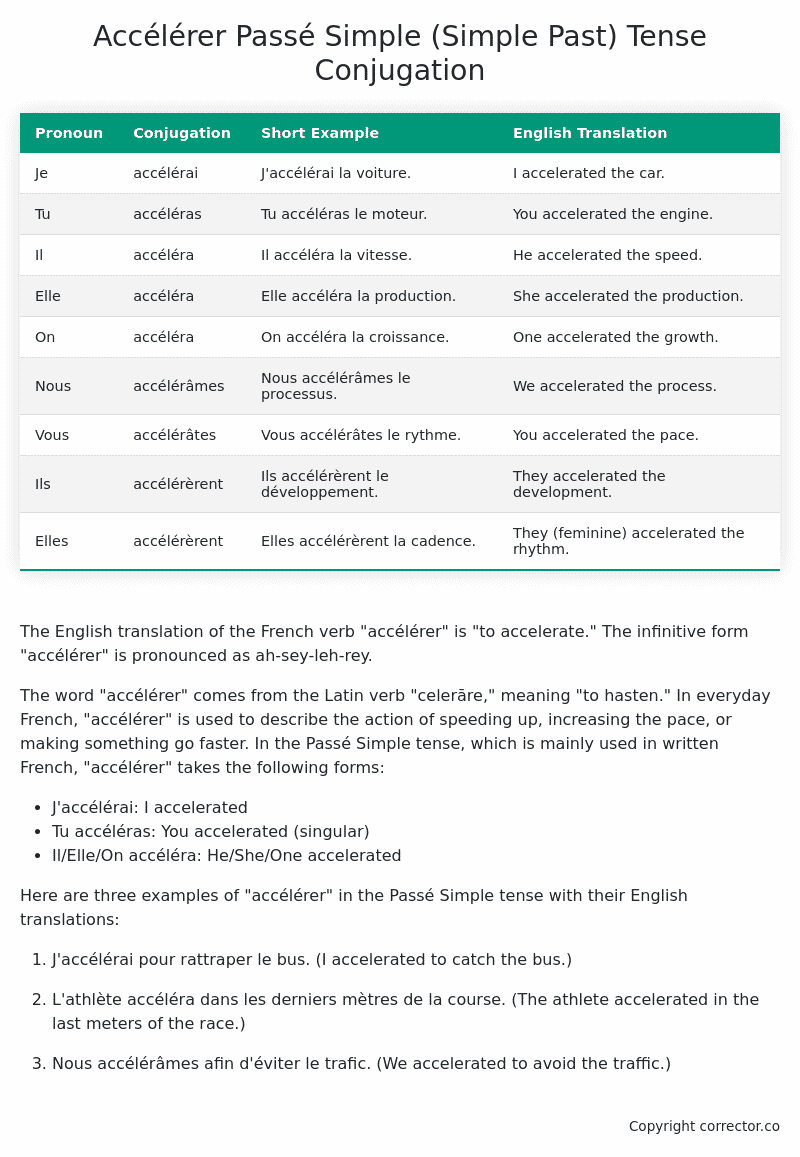Passé Simple (Simple Past) Tense Conjugation of the French Verb accélérer
Introduction to the verb accélérer
The English translation of the French verb “accélérer” is “to accelerate.” The infinitive form “accélérer” is pronounced as ah-sey-leh-rey.
The word “accélérer” comes from the Latin verb “celerāre,” meaning “to hasten.” In everyday French, “accélérer” is used to describe the action of speeding up, increasing the pace, or making something go faster. In the Passé Simple tense, which is mainly used in written French, “accélérer” takes the following forms:
- J’accélérai: I accelerated
- Tu accéléras: You accelerated (singular)
- Il/Elle/On accéléra: He/She/One accelerated
Here are three examples of “accélérer” in the Passé Simple tense with their English translations:
-
J’accélérai pour rattraper le bus.
(I accelerated to catch the bus.) -
L’athlète accéléra dans les derniers mètres de la course.
(The athlete accelerated in the last meters of the race.) -
Nous accélérâmes afin d’éviter le trafic.
(We accelerated to avoid the traffic.)
Table of the Passé Simple (Simple Past) Tense Conjugation of accélérer
| Pronoun | Conjugation | Short Example | English Translation |
|---|---|---|---|
| Je | accélérai | J’accélérai la voiture. | I accelerated the car. |
| Tu | accéléras | Tu accéléras le moteur. | You accelerated the engine. |
| Il | accéléra | Il accéléra la vitesse. | He accelerated the speed. |
| Elle | accéléra | Elle accéléra la production. | She accelerated the production. |
| On | accéléra | On accéléra la croissance. | One accelerated the growth. |
| Nous | accélérâmes | Nous accélérâmes le processus. | We accelerated the process. |
| Vous | accélérâtes | Vous accélérâtes le rythme. | You accelerated the pace. |
| Ils | accélérèrent | Ils accélérèrent le développement. | They accelerated the development. |
| Elles | accélérèrent | Elles accélérèrent la cadence. | They (feminine) accelerated the rhythm. |
Other Conjugations for Accélérer.
Le Present (Present Tense) Conjugation of the French Verb accélérer
Imparfait (Imperfect) Tense Conjugation of the French Verb accélérer
Passé Simple (Simple Past) Tense Conjugation of the French Verb accélérer (You’re reading it right now!)
Passé Composé (Present Perfect) Tense Conjugation of the French Verb accélérer
Futur Simple (Simple Future) Tense Conjugation of the French Verb accélérer
Futur Proche (Near Future) Tense Conjugation of the French Verb accélérer
Plus-que-parfait (Pluperfect) Tense Conjugation of the French Verb accélérer
Passé Antérieur (Past Anterior) Tense Conjugation of the French Verb accélérer
Futur Antérieur (Future Anterior) Tense Conjugation of the French Verb accélérer
Subjonctif Présent (Subjunctive Present) Tense Conjugation of the French Verb accélérer
Subjonctif Passé (Subjunctive Past) Tense Conjugation of the French Verb accélérer
Subjonctif Imparfait (Subjunctive Imperfect) Tense Conjugation of the French Verb accélérer
Subjonctif Plus-que-parfait (Subjunctive Pluperfect) Tense Conjugation of the French Verb accélérer
Conditionnel Présent (Conditional Present) Tense Conjugation of the French Verb accélérer
Conditionnel Passé (Conditional Past) Tense Conjugation of the French Verb accélérer
Conditionnel Passé II (Conditional Past II) Tense Conjugation of the French Verb accélérer
L’impératif Présent (Imperative Present) Tense Conjugation of the French Verb accélérer
L’impératif Passé (Imperative Past) Tense Conjugation of the French Verb accélérer
L’infinitif Présent (Infinitive Present) Tense Conjugation of the French Verb accélérer
L’infinitif Passé (Infinitive Past) Tense Conjugation of the French Verb accélérer
Le Participe Présent (Present Participle) Tense Conjugation of the French Verb accélérer
Le Participe Passé (Past Participle) Tense Conjugation of the French Verb accélérer
Struggling with French verbs or the language in general? Why not use our free French Grammar Checker – no registration required!
Get a FREE Download Study Sheet of this Conjugation 🔥
Simply right click the image below, click “save image” and get your free reference for the accélérer Passé Simple tense conjugation!

Accélérer – About the French Passé Simple (Simple Past) Tense
Formation
Usage
Narration
Historical Context
Interactions with other tenses
Passé Composé
Imparfait
Conditional and Subjunctive
Summary
I hope you enjoyed this article on the verb accélérer. Still in a learning mood? Check out another TOTALLY random French verb conjugation!


